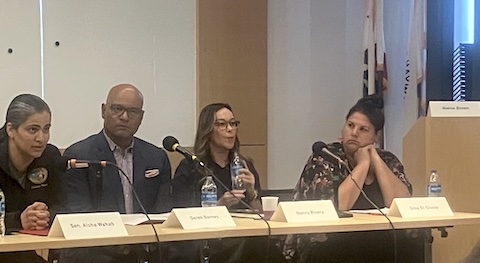
12 Nov For Many in the Bay Area, Affordable Housing Is Not Affordable

State Sen. Aisha Wahab, D-Fremont, left; East Bay Rental Housing Association CEO Derek Barnes; A-1 Community Housing Services executive director Nancy Rivera and Housing and Economic Rights Advocates attorney Gina Di Giusto speak at an American Community Media forum on housing at the Hayward Public Library. (Danielle Parenteau-Decker / The CC Pulse)
By Danielle Parenteau-Decker
HAYWARD — Owning a home is a key part of the American Dream, but for many Bay Area residents, it’s looking increasingly like a pipe dream, and experts say the problem is more complex than supply and demand.
For prospective homeowners and renters alike, so-called affordable housing often is not affordable or attainable.
That was the focus of an Oct. 14 forum hosted by American Community Media where housing experts, residents, and members of ethnic and local media gathered to examine the region’s worsening housing crisis.
The housing problem is often framed as an issue of supply and demand. The key to bringing prices down, the thinking goes, is to build more homes. But state Sen. Aisha Wahab, who was the keynote speaker and represents the Hayward area, said supply and demand is a false narrative, a fallacy promoted by the industry.
At the statewide level, housing is “siloed into one conversation: production and supply,” she said. “That’s wrong.”
“We’re not talking about production” as it “equates to the community and its needs,” she continued.
Wahab said that while there does need to be more housing — 2.5 million units overall and 1 million of them affordable across California — development alone is not the answer.
For starters, enough housing is just not being built, and the development that is happening is focused on market-rate housing. There is “less of a passion for affordable housing,” she said.
Wahab specifically called out the California Apartment Association, which represents the likes of property owners, developers, investors and managers. She said the industry group has spent more than $1 million this year “to silence voices that do talk about more affordable options and opportunities to keep people housed longer.”
She also noted that many units across the Bay Area remain vacant or are only used for short-term rentals. “That is a problem,” she said, but one that is politically unpopular to address.
“Nobody is going to go and say that the homeowner or property owner needs to be held accountable as well to ensure that those units are fully on the market,” Wahab continued.
When Wahab was elected, she says she was the only renter in the state Senate; she’s been a renter since her family lost their home in the 2008 foreclosure crisis.
“They’re unaware of how renters are treated,” she said, referring to her political colleagues.
No matter the reason, what it comes down to is that many families and individuals across the Bay Area cannot securely afford a place to live.
That’s largely because everything has gotten more expensive, greatly outpacing how much money people have.
“We look at it as a housing problem, but when I back up, I see it as an income problem,” said Christina Morales, the housing manager for the city of Hayward.
She said that even “the affordable rents have become unaffordable,” meaning that many applicants to affordable housing programs have been denied because their incomes were too low.
Those who do make enough money to qualify for affordable housing typically have to apply repeatedly, each time entering a lottery with thousands of other people and little chance of winning, according to Kary Hua, the housing program manager for ASIAN, Inc.
Prices are so high that “affordability is just out of the question,” said Nancy Rivera, executive director of A-1 Community Housing Services.
And that’s true across the age spectrum.
Seniors make up the largest demographic of the unhoused population, according to Wahab.
“The reality is that our seniors are struggling more and more,” she said. “We are not doing enough for our seniors. Point blank.”
Homeowners aged 65 and older are also more likely than ever to still be paying off their mortgages and for the payment to be a high percentage of their income, according to Maeve Elise Brown, the executive director and co-founder of Housing and Economic Rights Advocates.
Just a couple miles from the Hayward Library, where the forum was hosted, sits Cal State East Bay. There, Wahab said many students live in their cars.
Rivera said A-1 sees many young adults who don’t particularly want to try to become homeowners because of their families’ struggles.
“Many of the younger clients we meet with have witnessed their parents go through financial hardships, and some even lost their home, during the foreclosure crisis,” she told The Pulse.
Even if they are interested in owning a home someday, it’s often both less of a priority and financially out of reach. “For many, they want to keep their quality of life first and foremost,” she said. “Additionally, many carry large student debt, which hinders their purchasing power.”
A-1 advises young people in such situations to start small and tries to help them “work out a budget and to balance out a mortgage that is affordable while maintaining their current lifestyle, but then again, their lack of savings and the ‘needs vs. wants’ just don’t add up,” Rivera said.
At the Hayward conference, she said that her organization sees multigeneration families coming together to buy homes because it’s the only way they can afford to stay in the Bay Area.
She also said all prospective homeowners need to know that good credit is important, but even a perfect 800 FICO score isn’t enough if you don’t have the income to sustain it.
“It’s not about achieving homeownership,” Rivera said. “It’s about maintaining homeownership.”
Other speakers acknowledged how difficult that can be.
“After purchase is a long journey,” Hua said.
“There’s all these hurdles that people go through to get a home,” said Gina Di Giusto, a senior attorney at HERA. “Then there’s all these hurdles that people go through to keep the family home.”
HERA offers free legal services to homeowners facing such challenges, Brown said.
“You need legal help if you’re a homeowner,” she said. “We are your lawyers.”






No Comments